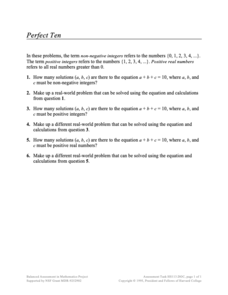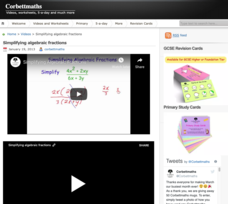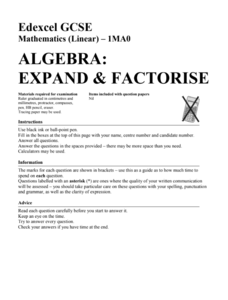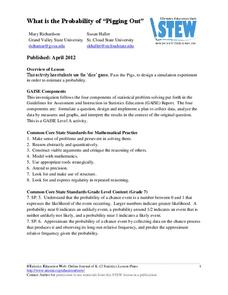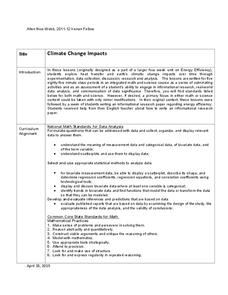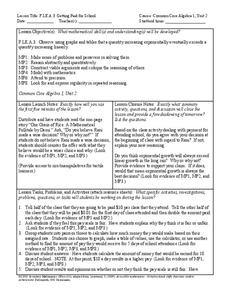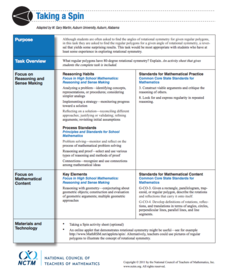Concord Consortium
Perfect Ten
How many ways can you make 10? Class members tackle three problems to find all possible ways three numbers add to be 10. The first is with positive integers, secondly with non-negative integers, and finally with real numbers. Pupils also...
Corbett Maths
Dividing Algebraic Fractions
Do the keep, change, flip dance. The resource shows that the division of algebraic fractions follows the same rules as dividing numerical fractions. Pupils understand that if they can multiply rational expressions, they can divide...
Corbett Maths
Multiplying Algebraic Fractions
Make the complicated look relatively simple. The video shows how multiplication of algebraic fractions is easier when they factor the numerators and denominators. Pupils see which factors will cancel, or divide out, easier when writing...
Corbett Maths
Simplifying Algebraic Fractions
Simplification is about factoring. While working with rational expressions, pupils must know how to factor. The video shows how the process of finding common factors in algebraic fractions is similar to finding common factors in...
Corbett Maths
Adding Algebraic Fractions
The process requires the combination of several concepts. A video shows how individuals need several concepts to add rational expressions. Pupils must remember they need to find common denominators, combine like terms, and use the...
Mathed Up!
Algebra: Indices
Indices and exponents mean the same. Pupils review exponential notation by watching the review video for the General Certificate of Secondary Education math assessment refresher. Scholars then use the activity to show what they know...
Mathed Up!
Expand and Factorise
Expand and contract algebra. Using a video from a larger review series, pupils refresh their skills to factor algebraic expressions. They also use the distributive property to expand expressions on the learning exercise. Problems range...
Mathed Up!
Sequences
Explicitly talk to the class about sequences. A segment of a review series for the General Certificate of Secondary Education math assessment provides a review of arithmetic sequences. Pupils watch a video showing how to find terms given...
American Statistical Association
What is the Probability of “Pigging Out”
Learners apply their understanding of luck to a probability experiment. They play a game of Pass the Pigs to determine the probability of a specific outcome. Using analysis for their data, pupils declare the measures of center, dot...
New York State Education Department
TASC Transition Curriculum: Workshop 7
Designed specifically for math instructors, the seventh workshop of a 15-part series allows time to explore Webb's DOK, ponder open-ended questions, and create lessons to apply what is learned. Teachers craft high-quality math problems...
Kenan Fellows
Climate Change Impacts
Turn up the heat! Young mathematicians develop models to represent different climates and collect temperature data. They analyze the data with regression and residual applications. Using that information, they make conclusions about...
EngageNY
TASC Transition Curriculum: Workshop 8
Lights, camera, action! Math educators consider how to improve their instruction by examining a model of the five-practice problem-solving model involving a movie theater. Participants examine cognitive demand in relation to problem...
Howard County Schools
Getting Paid for School
What if you were paid to attend class? What kind of payment schedule would you choose? Learn how exponential functions will eventually exceed linear functions by comparing two different payment schedules for attending class.
Howard County Schools
Factoring Trinomials Using Tiles
What's the opposite of multiplying binomials? Learners apply their previous knowledge of multiplying binomials using algebra tiles to factor trinomials. The lesson introduces factoring as a process that uses algebra tiles to...
101 Questions
Red Carpet
Roll out the red carpet for an exemplary lesson. Using the dimensions of a rolled piece of carpet, learners calculate the dimensions of the flat sample. Pictures provide individuals with the information they need to make a valid conclusion.
101 Questions
Styrofoam Cups
How many cups does it take to reach the top? Learners attempt to answer this through a series of questions. They collect dimension information and apply it to creating a function. The lesson encourages various solution methods and...
101 Questions
Toothpicks
Analyze patterns and build functions. Young scholars work on their modeling skills with an inquiry-based lesson. After watching a video presentation of the problem, they write functions and make predictions.
National Council of Teachers of Mathematics
Taking a Spin
It does not divide into 360 evenly, so it cannot work. The resource extends pupils' thinking about rotational symmetry. By asking for a figure with a rotational symmetry of a seemingly impossible angle, the activity requires learners to...
Mathematics Assessment Project
Representing Functions of Everyday Situations
Functions help make the world make more sense. Individuals model real-world situations with functions. They match a variety of contexts to different function types to finish a helpful resource.
Mathematics Assessment Project
Representing Quadratic Functions Graphically
Sometimes being different is an advantage. An engaging activity has scholars match cards with quadratic functions in various forms. Along the way, they learn about how each form highlights key features of quadratic functions.
Education Development Center
Finding Triangle Vertices
Where in the world (or at least in the coordinate plane) is the third vertex? Given two coordinate points for the vertices of a triangle, individuals find the location of the third vertex. They read an account of fictional...
Education Development Center
Sum of Rational and Irrational is Irrational
Sometimes the indirect path is best. Scholars determine whether the sum of a rational number and an irrational number is irrational. Reading a transcript of a conversation between classmates leads to an indirect proof of this concept.
Education Development Center
Integer Combinations—Postage Stamps Problem (MS Version)
Number patterns can seem mysterious. Help your learners unravel these mysteries as they complete an intriguing task. Through examination, collaborative groups determine that they are able to produce all integers above a certain value by...
Education Development Center
Distance, Rate, and Time—Walking Home
Dig into a classic math problem with your classes. Through an engaging task, learners work with rate and distance information to make conclusions. In the task, two people walk at different rates; one leaves first, and scholars calculate...


